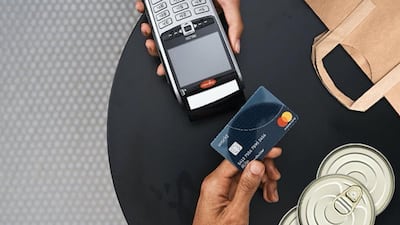Ninety-seven per cent of consumers surveyed in the UAE plan to use at least one new method of digital payment such as wearables, biometrics, digital currencies or QR codes within the next year, according to a new report.
This compares to a global average of 93 per cent, payments company Mastercard said in its report, which polled 15,569 consumers in 18 countries between February 26 and March 10. Almost 1,000 individuals in the UAE were interviewed.
Two-thirds of UAE respondents and 63 per cent globally said they have recently tried a new payment method they would not have used under normal circumstances.
The Covid-19 pandemic has driven customers to try “flexible new payment options to get what they want, when they want it”, the report said.
“The pandemic made us think differently, partly out of necessity,” Craig Vosburg, chief product officer at Mastercard, said.
The use of digital payment methods has grown rapidly since the onset of the pandemic as fear of contagion means people avoid using physical cash. Globally, digital payments are set to grow to $8.3 trillion in 2024, from $4.4tn last year, according to Statista.
Nearly 88 per cent of in-person transactions are now contactless in the UAE as “most merchant categories are seeing an increase as a share of total in-person transactions”, Mastercard said.
In the first quarter of this year, Mastercard registered nearly 1 billion more contactless transactions globally compared to the same period last year. Nearly 70 per cent of consumers across the world expect to use a contactless card this year, the report showed.
Matching the global average, more than three-quarters of those interviewed in the UAE said they prefer to shop more at small businesses that have both a physical and online presence.
Nearly 78 per cent of UAE respondents said they intend to shop at retailers that offer the latest payment methods and will be more loyal to merchants who offer multiple payment options.
As interest in digital currencies accelerates, five in 10 UAE individuals said they plan to use cryptocurrencies within the next year, with 63 per cent admitting they are more open to using them now than they were a year ago. Earlier this year, Mastercard said it will start supporting select cryptocurrencies directly on its network.
“Consumers today expect convenience and it is up to businesses to respond to this demand,” said Girish Nanda, Mastercard’s country manager for the UAE and Pakistan.
“We have also witnessed how small businesses too must be prepared for an omnichannel future. We foresee that speed and security will play an even more important role in delivering these needs and we expect continued growth of new solutions,” Mr Nanda said.
Fifty-five per cent of those surveyed in the UAE plan to use biometric verification methods to make payments and 68 per cent of the country’s users feel safer using biometrics to verify a purchase than entering a personal identification number.
The concept of digital wallets is also taking off in the Emirates. About 66 per cent of consumers said they are more likely to use digital wallets and 57 per cent of shoppers felt safe storing their card information in a single place such as a digital wallet, the survey found.


